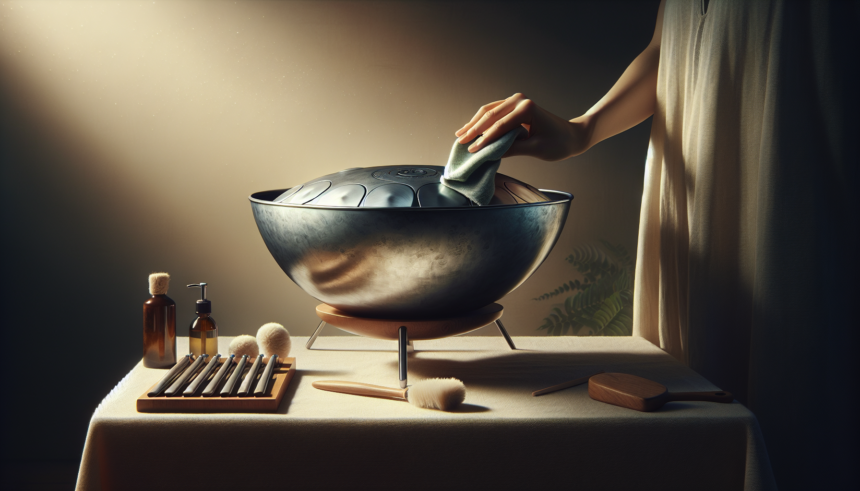The handpan, a relatively new musical instrument, has captured the hearts of many musicians and music enthusiasts around the world. Its unique, ethereal sound makes it an exceptional addition to your musical repertoire. However, owning a handpan also comes with the responsibility of maintaining it properly to ensure its longevity and pristine sound quality. This article will provide you with essential handpan care tips to protect your instrument and keep it in top condition.
1. Understanding Your Handpan
Before diving into the care tips, it’s crucial to understand the structure and material of your handpan. Handpans are typically made from nitrided steel, stainless steel, or raw steel. Each material has its specific characteristics and care requirements. Knowing the type of steel your handpan is made from will help you apply the appropriate care techniques.
2. Cleaning Your Handpan
Regular cleaning is essential to maintain the appearance and sound quality of your handpan. Here are steps to clean your handpan properly:
- Wipe After Each Use: Use a soft, dry microfiber cloth to wipe down your handpan after every playing session. This helps remove sweat, oils, and fingerprints.
- Deep Cleaning: For a more thorough clean, use a mild soapy solution. Dampen a cloth with the solution, wring out excess water, and gently wipe down the surface. Avoid using harsh chemicals or abrasive materials, as these can damage the instrument.
- Rinse and Dry: After cleaning with soap, wipe the handpan with a damp cloth to remove any soap residue. Finally, dry the instrument thoroughly with a soft, dry cloth.
3. Oiling Your Handpan
Oiling your handpan is crucial for preventing rust and maintaining its shine. Here’s how you can oil your handpan:
- Select the Right Oil: Use a dedicated handpan oil or a natural oil like coconut oil or olive oil. Avoid using synthetic oils or lubricants.
- Apply Sparingly: Pour a few drops of oil onto a soft cloth. Gently rub the oil onto the handpan’s surface in circular motions. Ensure even coverage without excess oil accumulation.
- Wipe Off Excess: After oiling, let the instrument sit for a few minutes, then use a clean cloth to wipe off any excess oil.
4. Handling and Storing Your Handpan
Proper handling and storage are key to preventing physical damage to your handpan:
- Use a Protective Case: Invest in a high-quality, padded case to protect your handpan during transport. Ensure the case fits your instrument securely and provides ample cushioning.
- Avoid Extreme Temperatures: Extreme heat or cold can negatively affect the tuning and structural integrity of your handpan. Store the instrument in a cool, dry place, away from direct sunlight and heaters.
- Stable Surface: When playing or storing your handpan, place it on a stable, flat surface to prevent it from falling or sustaining dents.
5. Playing Techniques
How you play your handpan also affects its longevity. Here are some tips for playing your handpan correctly:
- Play with Clean Hands: Always play with clean, dry hands to minimize the transfer of oils and dirt onto the instrument.
- Use Proper Technique: Striking the handpan with excessive force or using inappropriate objects (like sticks or mallets) can cause dents and affect the sound quality. Use your hands and fingers to produce gentle, resonant tones.
6. Periodic Maintenance
Periodic maintenance ensures your handpan remains in top condition:
- Check for Rust: Regularly inspect your handpan for any signs of rust. If you notice any rust spots, address them immediately using a rust remover and follow up with oiling.
- Retuning: Over time, your handpan may go out of tune. Consult a professional handpan tuner for retuning services to maintain its harmonic integrity.
7. Protecting During Travel
If you’re traveling with your handpan, extra precautions are necessary:
- Use a Flight Case: For air travel, invest in a rugged flight case that offers maximum protection against rough handling.
- Label as Fragile: Always label your handpan case as fragile and inform the airline staff to handle it with care.
- Secure Within the Vehicle: If you’re traveling by car, secure the handpan in the trunk or back seat with seat belts or straps to prevent it from moving during the journey.
Conclusion
Owning a handpan is both a privilege and a responsibility. Proper care and maintenance are essential to preserve its unique sound and structural integrity. By understanding your instrument, cleaning it regularly, oiling it appropriately, handling and storing it cautiously, playing it with proper techniques, performing periodic maintenance, and taking extra precautions during travel, you can ensure your handpan remains in pristine condition for years to come.
FAQs
1. Can I use any kind of oil on my handpan?
It’s recommended to use dedicated handpan oils or natural oils like coconut or olive oil. Avoid synthetic oils or lubricants, as they may damage the instrument’s surface.
2. How often should I clean my handpan?
You should wipe down your handpan with a dry cloth after each use. For deep cleaning, aim to clean your handpan with a soapy solution and re-oil it every few months, depending on how often you play it.
3. What should I do if my handpan develops rust?
If you notice rust spots on your handpan, address them immediately using a rust remover. After treating the rust, ensure you thoroughly clean and oil the instrument to prevent future occurrences.
4. Can I retune my handpan myself?
Retuning a handpan requires specific skills and tools. It’s advisable to consult a professional handpan tuner for this service to maintain the instrument’s harmonic integrity.
5. How should I store my handpan when not in use?
Store your handpan in a cool, dry place, away from direct sunlight and extreme temperatures. Using a high-quality padded case can provide additional protection when the instrument is not in use.





